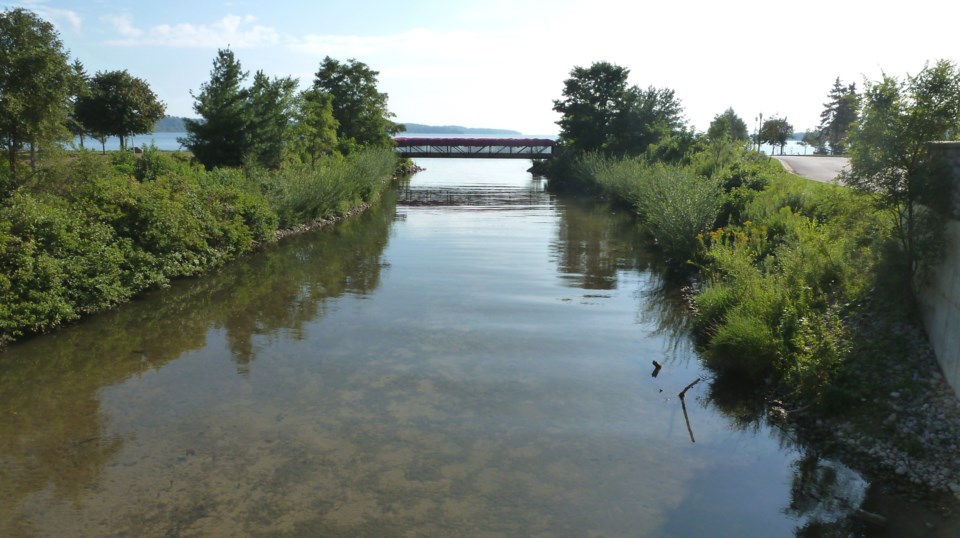The owners of single-family Barrie homes should pay $10.75 a month — or $129 annually — in storm-water user fees starting this spring, city councillors heard Wednesday night.
But since the average homeowner currently contributes $174 annually toward storm-water management through property taxes, there would be savings.
This was part of a presentation on the storm-water climate action fund. Its fees still need approval as part of the 2023 city budget.
“Most residential properties will be paying less under this fee model,” said Kelan Jylha, the city’s manager of tax and revenue, who is also overseeing this project. “This is a big program that will be impacting everyone in the city of Barrie.”
It would raise $10.5 million annually for storm-water management.
“When the infrastructure asset management plan was done, it indicated we should be spending closer to $40 million (a year) and we’re a quite a ways off from that, so the $10.5 million, if you remember, we’re not increasing service levels,” said Craig Millar, the city’s chief financial officer.
“This is currently what we collect on the property tax bill, so at this point in time it’s a shifting of the cost from the tax bill to a user-pay system, but it’s the equivalent amount as to what we have been collecting,” he added. “I think it’s approximately $500,000 more than what we had in the 2022 budget.
Storm water includes rain, melted snow or water that runs off roofs, driveways and roads rather than soaking into the ground. It either flows into rivers and waterways or is channelled into storm sewers.
The fund is to help improve the city’s resiliency against climate-change impacts, mitigate flooding, and protect Lake Simcoe and groundwater sources.
“What are the measurables of success of this program?” said Mayor Alex Nuttall. “Is the measurable that we’re no longer on the tax rate and we’ve moved it over to a user-pay program? Or is there a goal towards the reduction of storm-water runoff?”
Starting in the spring of 2023, the costs of Barrie’s storm-water program would shift from property taxes to what the city calls a more equitable user fee.
Barrie water customers would see , beginning next spring, a storm-water fee on their water/wastewater bills.
The city says this is not a new tax. Storm-water management costs are currently paid from property taxes. Effective the spring of 2023, these costs would be paid for on the water/wastewater bill, and based on the type of property owned.
The storm-water user fee is calculated by the amount of impervious area on a given property — a hard surface such as concrete, asphalt or rooftops that does not absorb water. Water runs off impervious surfaces, collects pollutants and flows into local creeks and Lake Simcoe. In undeveloped areas, storm water soaks into the ground and slowly flows into aquifers and waterways. In developed areas, impervious surfaces prevent storm water from soaking into the ground.
“Under the current tax levy model, residential property owners are paying 75 per cent of the cost of the current service levels for storm water, while only contributing 54 per cent of the total impervious areas within the city,” Jylha said. “Non-residential properties are paying 25 per cent of the cost of contributing 46 (per cent) to the impervious areas.”
There are four categories for residential storm-water user-fee bills. Detached residential units (DRU) pay full price, semi-detached homes and duplexes 0.7 of a DRU fee, three- and five-plexes, condos and townhouses 0.5 of the DRU fee, and apartments with seven or more units 0.4 of the DRU fee.
There are also non-residential storm-water user fees. A restaurant would save $618, for example, a neighbourhood shopping centre $13,200, while a vehicle dealership would pay $3,730 more and a parking lot another $4,309.
A credit program is also proposed.
Non-residential properties would qualify for reduction in their storm-water user fee by having on-site storm-water management measures. This could include removing sediment and pollutants, water quantity control such as reducing peak flow rates by detaining flows on-site and releasing flows. There’s also water volume reduction, such as capturing water on site to infiltrate into the ground or to be used for irrigation.
A reduction of as much as 50 per cent of a storm-water bill is available.
Storm-water management is the capture, collection, storage, treatment, and conveyance of water in response to rainfall and melted snow.
Barrie’s storm-water challenges include flooding due to insufficient capacity, causing private and public property damage, deteriorating infrastructure and climate change — which exacerbates existing issues and creates new ones — and insufficient overflow routes.
The storm-water climate action fund is to pay for the city’s operating and capital storm-water infrastructure needs.
In February 2022, council instructed staff to continue implementing the fund and move forward with the development of policies and hiring staff to administer the program.
Councillors heard Wednesday that next steps are a storm-water brochure mailed out to all property owners in December, approval of the staff report motion and bylaw, then finalizing the storm-water rates during 2023 budget approval process of January and February, the water bill insert mailed out to property owners in March and in April 2023, billing would begin.
This program was approved by the 2018-22 city council, but it is the 2022-26 council which must include storm-water user fees in next year’s operating and capital budget.



